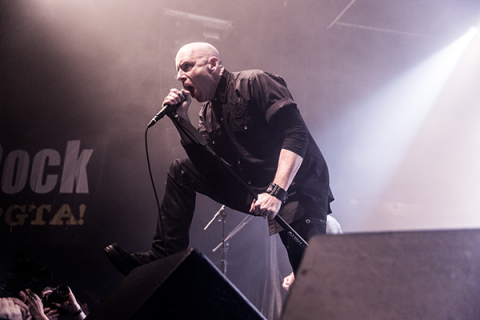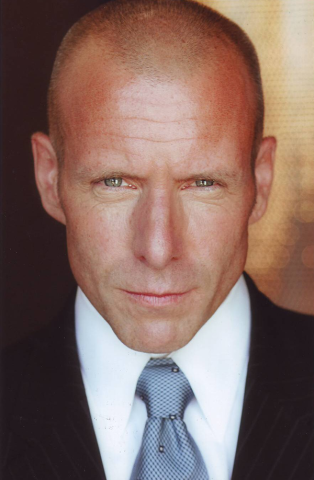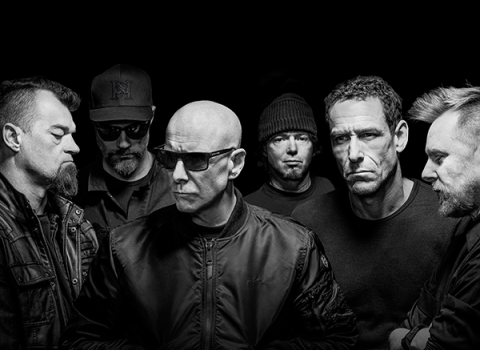
Hugh Dillon could go “on and on,” he says, about addiction and recovery and hitting rock bottom before seeking help. The frontman for enduring Canadian rock band Headstones for the past 30 years and accomplished actor — from his classic lead performance as punk singer Joe Dick in Bruce McDonald’s Hard Core Logo in 1996 to starring in television series such as Durham County, Flashpoint, and The Killing to the current X Company — has a new album out today (June 2), Little Army.
True to the band, it’s a raw, ripping, open, visceral, unpolished collection of cool rock songs, preceded by the first single, “Devil’s On Fire,” made with his long-time bandmates Tim White (bass) and Trent Carr (guitar), which they will be celebrating with two sold-out back-to-back benefit shows tonight at Toronto’s Velvet Underground in support of The Centre for Addiction and Mental Health (CAMH).
CAMH is Canada's largest mental health and addiction teaching hospital and one of the world's leading research centres in those areas. Its central facilities in Toronto include 90 distinct services across inpatient, outpatient, day treatment, and partial hospitalization models.
Dillon, who will perform shows with Headstones this July and August and has a new film coming out opposite Nicolas Cage called The Humanity Bureau, talked to Samaritanmag about selecting CAMH for these charity shows, the importance of taking that first step to get help, and the worry of some artists that being clean will affect their art. But he didn’t leave out words for enablers too.
What is your association with CAMH or what is it you like about what they do?
I’m trying to think of the best way to get into it without giving too much. I do a lot of work with people, kids who have drug and alcohol problems.
CAMH is amazing, so comprehensive. People talk about ‘mental health issues,' as an umbrella term, but it can cover everything from schizophrenia to bulimia to alcohol and nicotine addiction to depression. It’s so wide ranging. It’s such an amazing hospital in that regard, helping everyone from youth to seniors.
Yeah. For me, it’s just bringing awareness to this hospital that helped me years ago. It’s the first point of contact if you have no idea where to go with drug and alcohol problems or mental illness. To know that there is somewhere to go and reduce the shame and the stigma attached to it, that’s really all it is. And it goes back to when we [the Headstones] got back together. We got back together [in 2011] and did some personal work [and benefit shows] for a friend of ours who was in the band, who was dying of cancer, and his name was Randy Kwan and he was such a big part of the band [he co-wrote 1993's "Cemetary," among other songs]. When I had problems, or some other guys in the band had problems, that [CAMH] is the first place to go where they can assess you and figure out what can you do to help yourself and help your family. So that really is the first point of contact. And get yourself there.

It’s such a cliché in the music world. It’s almost expected that you would go through that rollercoaster. You’ve had the Headstones for three decades. Was there that cool factor early on in your career? Sometimes industry people buy you drugs or alcohol. They had expense accounts for copious amount of alcohol. Fans give drugs to you too. It’s tough to be sober or even have a recreational relationship with alcohol.
Well, I guess that was my point. That’s why I like it [CAMH] because there is nothing cool or romantic and there are so many people who are collateral damage in the business, in any walk of life, even with Chris Cornell lately. It is such a serious issue if it isn’t dealt with. The problem with people in certain businesses like mine is there is a built-in isolation if you’re not careful. So then it becomes even harder to deal with it and you've got to be constantly on top of it because things like depression can just roll in like a fog and can hit you anytime. It doesn’t matter how well you’re doing or how much money you have or how successful you are.
So that’s the great thing about CAMH or any place with a great outreach program or family program or rehab program, they teach you, besides what to look for, what to look at, how your behavior is manifested and is influencing your family, yourself, your decisions. And it really is just that. I wouldn’t be here without that kind of intervention and, of course, the love and support of my family, but you need professionals to really guide you through this. It’s a cliché, but people say, ‘If you break your arm or you hurt yourself physically, you go to the hospital and everybody understands that, but people don’t understand if you have some kind of a mental or chemical imbalance because you can look okay on the outside’ — and therein lies the problem.
You’re right with Chris Cornell recently and Prince. Amy Winehouse, the documentary [2015's Amy] on her gives a glimpse of addiction and enabling. How do you think people at the labels, at management, at agencies or even fans should respond? People get intimated or uncomfortable or they don’t want to overstep their boundaries or lose their job.
You have to. You have to and that’s why not just the individual but the people close to them need to get counselling and learn about tough love and learn what the proper way is to react for everyone’s sanity because you don’t want people to die or relapse or act out or some horrible thing happens. It’s a community; it’s a family; it’s such a bigger issue than just the individual and you have to start looking at it in those terms. That’s why some of these places like CAMH or Renascent house — there’s a couple of them in Toronto — I went to Bridgeway Chemical Dependency, there are so many great places, but you got to start somewhere. CAMH is like the catch-all. If you don’t know where to go, or some of these other places in your neighborhood, CAMH can assess and then point you in the right direction. That’s why it’s got the awareness and that’s why it can work.
For example, this morning, I get up, check my email, check Facebook, the Headstones thing, there’s a young woman on there who said — I’ll paraphrase — she said there’s lots of bands; I relate to different kinds of bands, lyrics and melody, but recently I attempted suicide and I have got to say thank you because I liked your song ‘Judy’ and ‘Without A Sound.’ There is something in the music that helps people because I talk about those issues in those songs; they’re in the lyrics.
‘Without A Sound’ was about…it’s a long story but people I know. I mean suicide is a reoccurring theme in this band, unfortunately, just because that’s how it’s been, but having said that, this woman has gone out; she gotten help; she’s friends with somebody else who is a big fan of the band and now she’s stabilized. She’ll go to an outdoor show, not the alcohol shows. So even in the community of the people who like this band, I’m out there; I’m writing songs; we’re better than we have ever been and, underneath it all, people know that I have done a lot of work to get here. So it’s a funny combination between the kind of the aggression of band, the rock and rollness of the band, but yet people do understand that it is a band that is built on hope and dreams and positive things.
That’s the other thing. For me, I could go on, but there is a whole component, when I got help, with art that can help a lot of people. It is awareness, but it more than that; it’s education because — and I’m speaking from experience — I had all these negative connotations: ‘I don’t want to do that; it’s like going to jail' or 'It’s One Flew Over The Cuckoo’s Nest.’ You have all these negative thoughts about something you know nothing of. That’s why it’s so important because when you get in and start to speak to real professionals and you start to see the level of care and dedication and knowledge, it can unlock the hearts of moms and dads and family because finally it’s like somebody is saying these people aren’t bad; they just are sick, and once you know that, then you can work towards recovering.
The terrible side of it is not diagnosing anything and having people act out or walk in front of traffic or feel that they have no hope and then the darkness of depression turns into a suicidal darkness. And that’s why I’m constantly…it is about moving forward and making art, in my case, or awareness, or doing whatever you can because when it affects the family or kids — kids are dying — it just such a, it’s so, um, there are no words for this.

Tragic, right?
Yeah, it’s needlessly tragic. If people knew that there was hope and having said that, in last couple of years whenever I’m back home, I’ll get a call and there will be somebody who’s at the hospital in the psyche ward or whatever, but sometimes those are brought on by drugs. Sometimes, if people call me, I’ll go and talk to whoever that may be because a lot of is you can reach out and you can help people with your experience. People wouldn’t think sometimes that, for example, I came from there or other people I know or other people in the band have serious issues. With my band especially, there were other members of the band who have had serious issues who are no longer in the band. Goes back 30 years, but the core members, me and Tim and Trent have stuck together. The reason we stuck together, it goes back to what you said earlier about managers and the enabling and record companies and things like that. I've got to say, my manager Bernie Breen — and I never talk about him — but this is the guy who at the time when I was in the worst shape of my life, I needed to walk away from the band, and Tim White was really like, ‘He’s going to die,’ but people always said that, but it was very serious, and it was difficult for my family and it was difficult for me because I knew nothing else. And my manger said that the best thing you can do, we’ll have to call it a day; it’s been a good run, but nobody wants my death on their hands. So that is really forward-thinking manager and later I came back.
And Tim White too, for a musician to be in band, we were in the band together; we made these records; that was our life; that was our personality; it was such a big decision and such a generous decision for them, but they really understood and Tim and Trent were, again, their instinct is to play and move on; they’re musicians, and this is their life and this is the band they built, but they were willing to walk away. And a lot of people aren’t. It’s all money and it’s all tied together and personality. So, in my case, I was very lucky. And it comes back to why we are doing it this June 2 for CAMH. The whole band, we got here because we were able to get help and recognize that we needed it to find the right people to help us.
Before you got help, did you worry that being clean, being lucid, not doing drugs or alcohol, would affect your ability to write great songs — and not just great songs but those raw, gritty rock and roll songs?
Yeah. You worry about everything. If you’re using drugs and alcohol on that level, I could worry about that, I could worry about anything. It’s all tied into the same thing, but it’s all an illusion and you don’t ever realize that until you go through it. The simple fact of the matter is when you listen to this record, listen to ‘Broken.’ When I finish records now, Tim and Trent and Chris Osti who produced it, you can just see the evolution of songwriting. It’s the most satisfying thing in the world and back then you wouldn’t have thought that was the case, it’s such an illusion. You know, people are built to evolve; it’s that simple and if you can take things out of the way to allow you to evolve, that’s what life’s all about. That’s why, just coming back to the heart of it, we do it whether we have a record deal or we don’t have a record deal or whatever. There is something that’s exceptional about the chemistry that we have and our ability to work through our lives and our emotions and how we feel because we trust each other so much. So this band is different in a lot of ways. It’s therapeutic and cathartic for us on a lot of levels. But to answer your question, I would never have thought it possible.
For some artists, that is a big worry.
Yeah, but that’s before you hit bottom if that’s your worry. My worry was I was going to die in a hotel room. I was very cognizant of the fact that I wasn’t just using and drinking or depressed or whatever and ending up with writer’s block, I was ending up in hospitals rooms, in jail. So I was realizing my bottom was coming very fast and you get that moment of clarity and, with me, it was I could see the look on my wife’s face or my sister's face, and if you can get that moment of clarity and you know where to go, then you can pick up the phone or go to CAMH or wherever it is you have to go, but there is a way out. It's such a tricky thing because what’s funny is if you’re still just hemming and hawing — and I can get into it and this is just one component with the addiction — but if you’re still hemming and hawing about, "you know I won’t be able to write about...,' you haven’t fuckin' hit the wall yet, you know what I mean [laughs]? It’s going to be a longer process for you, if you're still, "Well, you know, maybe I...' I’m talking about breaks with reality [laughs[ and overdosing and there are all sorts of artists we see who get to this suicidal point or who are crashing cars and I think that’s when you really need to reevaluate or reaccess or if somebody that loves you or is close to you can guide you to talk to someone, you may have a chance. That’s the thing at the end of the day, it’s an opportunity to prevent tragedy, really.
WATCH HEADSTONES' NEW VIDEO:
The world is yours – Neue Sneaker, Apparel und mehr für Kids